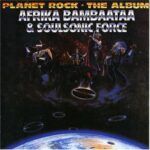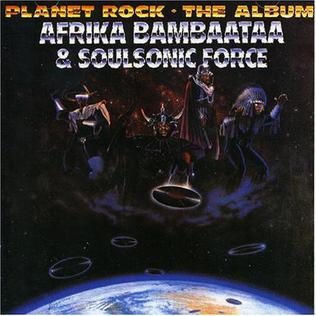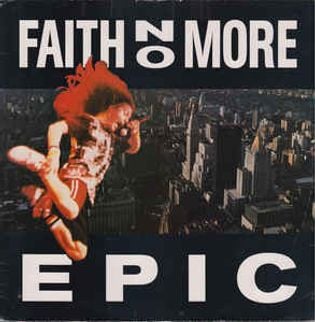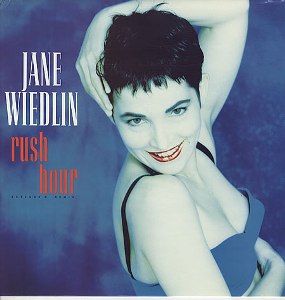 Long before electronic music dominated clubs, festivals, and airwaves, a visionary Bronx DJ helped rewrite the possibilities of what hip-hop—and popular music itself—could sound like. Afrika Bambaataa’s “Planet Rock,” released in 1982, arrived at a moment when hip-hop was still defining its identity, still rooted in block parties, sound systems, park jams, and the culture-shifting creativity of DJs and MCs. Yet Bambaataa wasn’t content to stay within established boundaries. “Planet Rock” was his bold declaration that hip-hop could be bigger, broader, stranger, more futuristic, and more global than anyone imagined. With its fusion of electronic textures, pulsating rhythms, and cosmic aesthetic, the track became one of the most important and influential recordings in the history of modern music.
Long before electronic music dominated clubs, festivals, and airwaves, a visionary Bronx DJ helped rewrite the possibilities of what hip-hop—and popular music itself—could sound like. Afrika Bambaataa’s “Planet Rock,” released in 1982, arrived at a moment when hip-hop was still defining its identity, still rooted in block parties, sound systems, park jams, and the culture-shifting creativity of DJs and MCs. Yet Bambaataa wasn’t content to stay within established boundaries. “Planet Rock” was his bold declaration that hip-hop could be bigger, broader, stranger, more futuristic, and more global than anyone imagined. With its fusion of electronic textures, pulsating rhythms, and cosmic aesthetic, the track became one of the most important and influential recordings in the history of modern music.
The beauty of “Planet Rock” lies not only in its innovation, but also in its sense of adventure. While many early hip-hop records leaned heavily on funk and disco samples, Bambaataa and producer Arthur Baker embraced the emerging world of electronic music, pulling from Kraftwerk’s mechanized precision, George Clinton’s Afrofuturist imagination, and their own Bronx-born sensibilities. The result was a song that felt like a transmission from another world—robotic yet soulful, synthetic yet deeply human, and unlike anything else that existed at the time. The track didn’t just push boundaries; it erased them.
The Birth of Electro: A New Sound for a New Era
“Planet Rock” is widely recognized as the pivotal track that birthed the electro subgenre. Before its release, early hip-hop production relied primarily on funk loops, live drumming, and disco rhythms. Bambaataa changed that by embracing the Roland TR-808 drum machine, an instrument that would eventually become one of the most iconic sound sources in modern music history.
The 808’s booming kicks, crisp snares, and spacey handclaps formed the backbone of “Planet Rock,” creating a sonic landscape that was colder, sharper, and more futuristic than anything in hip-hop at the time. The inclusion of Kraftwerk-inspired synth lines and robotic melodies added an otherworldly dimension, giving the song a cosmic identity. It sounded like breakdancing on a satellite, like graffiti on a spaceship hull, like the Bronx going interstellar.
This blending of cultures—Bronx street creativity and German electronic minimalism—was groundbreaking. It signaled that hip-hop wasn’t just sampling Black American funk but could pull inspiration from anywhere in the world. This global perspective would eventually become one of the genre’s most defining traits.
Afrika Bambaataa’s Visionary Mindset
Bambaataa wasn’t simply a DJ; he was a cultural architect. As a leader of the Universal Zulu Nation, he believed in unity, peace, knowledge, and artistic evolution. “Planet Rock” wasn’t just a song—it was a manifesto, a celebration of diversity, and a belief that music could bring people together across neighborhoods, cultures, and continents.
His decision to experiment with synthesizers, electronic textures, and unconventional musical influences reflected his broader worldview. Bambaataa wasn’t interested in imitation—he was interested in innovation. In the early ’80s, when most hip-hop DJs were doubling breaks and stacking funk records, he was searching for sounds that hinted at the future.
This forward-thinking mindset is embedded in every second of “Planet Rock.” From the vocoder-treated vocals to the shimmering keyboard lines, the song is drenched in the feeling of possibility. Bambaataa wasn’t just making a dance record—he was imagining the next evolution of culture.
The Production Brilliance of Arthur Baker and John Robie
While Afrika Bambaataa provided the vision, producers Arthur Baker and John Robie were crucial in shaping the track’s groundbreaking sound. Their understanding of electronic music mechanics gave “Planet Rock” its unmistakable edge.
Working with early drum machines and analog synthesizers required both technical mastery and creative courage. There were no templates, no digital presets, no established formulas for making electro-infused hip-hop. Everything they did was experimental, and the studio became a lab for sonic exploration.
Robie’s keyboard work helped define the futuristic vibe, while Baker’s production instincts ensured that the track remained danceable, energetic, and accessible. The three-way collaboration between Bambaataa, Baker, and Robie created a synergy that pushed each artist beyond their comfort zone and into new territory.
The final product didn’t just sound innovative—it sounded revolutionary.
How “Planet Rock” Redefined the Dancefloor
Before “Planet Rock,” hip-hop was already tied to dance culture—breakdancers, poppers, and lockers were essential parts of the movement. But this track electrified the dancefloor in ways that early rap hadn’t yet achieved.
Its tempo was faster, its rhythms more mechanized, its energy more propulsive. It gave dancers a new kind of music to move to, one that demanded precision, speed, and style. Electro dance culture exploded, inspiring waves of b-boys and b-girls who found the song’s robotic pulse irresistible.
Clubs across New York—and eventually across the world—found themselves transformed. DJs embraced “Planet Rock” not just as a hip-hop track, but as a universal dancefloor weapon. Its infectious groove transcended genre boundaries, appealing to fans of funk, new wave, electronic music, and emerging dance scenes.
It was one of the first hip-hop records that truly felt global.
A Blueprint for Future Genres
The legacy of “Planet Rock” extends far beyond hip-hop. Its influence can be felt in:
-
Techno – Detroit pioneers like Juan Atkins and Derrick May credited the song as foundational to the creation of the techno genre.
-
House music – Early Chicago producers drew from its electronic percussion and robotic aesthetic.
-
Miami bass – The 808-heavy sound became the heartbeat of an entire regional movement.
-
Electro-funk – Artists like Egyptian Lover and the West Coast electro scene built directly from Bambaataa’s formula.
-
Pop music – The 808 and synthesized melodies influenced artists across decades.
At the time of its release, no one could have predicted that “Planet Rock” would become the seed from which multiple genres would grow. But that’s exactly what it became: a foundational text for the next forty years of global music.
Lyrics That Match the Energy
While the production is the centerpiece of “Planet Rock,” the lyrics contribute to its intergalactic feel. Bambaataa and the Soulsonic Force deliver verses that merge party energy with futuristic flair. The call-and-response lines, rhythmic chants, and vocoder treatments reinforce the sense that this is a celebration from another universe.
The song doesn’t focus on storytelling or social commentary, but instead aims to elevate the listener’s mood. Its mission is simple: move the body, expand the mind, and invite the listener into a world of possibility.
The lyrics act as the ceremonial guide through this new musical dimension, encouraging unity, dance, and cosmic exploration.
Why It Still Feels Modern
Despite being released in 1982, “Planet Rock” remains fresh, energetic, and relevant. Its reliance on electronic instrumentation means it hasn’t aged in the same way many funk-based hip-hop tracks from the early ’80s have.
Its futuristic vision helped it escape the timestamp of its era. New listeners often hear it for the first time and are shocked to discover its age. Its influence in modern EDM, trap, pop, and techno continually refreshes its place in music history.
In an era where genre lines frequently blur, “Planet Rock” sounds prophetic.
Closing Thoughts
Afrika Bambaataa’s “Planet Rock,” released in 1982, stands as one of the most transformative songs in the history of hip-hop and electronic music. It was bold, boundary-shattering, and visionary, carving out new terrain at a time when the genre was still forming its identity. The collaboration between Bambaataa, Arthur Baker, and John Robie produced a sonic breakthrough that continues to ripple across decades and genres.
The song’s fusion of electronic soundscapes, 808-driven rhythms, and interstellar imagination created an entirely new musical vocabulary—one that countless artists continue to draw from today. “Planet Rock” didn’t just expand the limits of hip-hop; it expanded the possibilities of modern music itself.
In every shimmering synth, every robotic pulse, and every futuristic chant, the track reminds listeners that innovation doesn’t come from following rules—it comes from daring to build new worlds.



